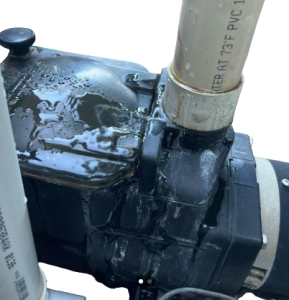Why Timely Pump Leak Repair is Crucial for Your Pump Equipment
At ASAP Pumps, we understand that your pumps are the workhorses of your property, whether they’re keeping your swimming pool sparkling, managing your well water, or handling industrial fluids. While these machines are built to last, even the smallest water leak can escalate into a major problem, costing you significant time, money, and grief. This is especially true when dealing with the demanding environment of pump operation.
Let’s dive into why addressing pump leaks promptly is not just a recommendation, but a necessity for the longevity and efficiency of your pumping system.

The Silent Threat: Where Leaks Often Hide
You might think a small drip is harmless, but it’s a clear sign that something isn’t right. Two common culprits for water leaks in pumps are:
The Mechanical Seal: This critical component forms a watertight barrier between the rotating shaft of the pump and its stationary housing. Over time, due to normal wear and tear, dry running, vibrations, or even harsh chemicals, the mechanical seal can degrade and begin to leak. A leak from the mechanical seal is often visible as water dripping or spraying from where the motor connects to the pump.
The Discharge Pipe: This is the pipe through which the pumped fluid exits the unit. Connections, fittings, or even the pipe itself can develop leaks due to age, pressure fluctuations, or physical damage. For swimming pool pumps, sometimes the basket lid, if not sealed tightly, can also allow water to escape.
Why a Leak Never Fixes Itself (and Only Gets Worse)
It’s tempting to ignore a minor drip, hoping it will somehow resolve itself. Unfortunately, a water leak in a pump is like a small crack in a dam – it will only expand and lead to more significant issues. Here’s why:
Corrosion and Deterioration: Water, especially chlorinated pool water or industrial chemicals, is highly corrosive. Constant exposure to moisture will degrade pump components, leading to rust, material weakening, and further leaks.
Compromised Performance: A leaking pump loses efficiency. It has to work harder to maintain the desired pressure and flow, leading to increased energy consumption and higher utility bills.
The Hidden Danger: Your Motor's Vulnerability
Beyond the immediate water loss, an unattended leak poses a severe threat to the most expensive component of your pumping system: the electric motor.
Electric motors generate heat during operation. To prevent overheating, they rely on a cooling fan located inside the motor. This fan acts like a vacuum, drawing in ambient air to dissipate the heat generated by the motor’s normal work.
When a water leak goes unaddressed, particularly from the mechanical seal, that leaking water can be drawn directly into the motor housing by the cooling fan. This introduces moisture to sensitive internal components, leading to:
Premature Bearing Failure: The bearings support the motor’s rotating shaft. Water contamination washes away lubrication, causes rust, and accelerates wear on these bearings, leading to excessive noise, vibrations, and eventually, complete bearing seizure.
Damage to Motor Copper Windings: The motor’s core consists of delicate copper windings, insulated by a protective varnish. When water infiltrates these windings, it can compromise the insulation, leading to short circuits. This not only causes the motor to draw heavy current, generating excessive heat, but can ultimately result in irreversible damage to the copper windings, necessitating a costly motor replacement or rewind.
Save Yourself the Grief: Act Fast!
The message is clear: a water leak does not fix itself. Ignoring it is a gamble that almost always leads to more expensive and time-consuming repairs down the line.
Think about the consequences:
Increased Repair Costs: A simple seal replacement (often a DIY job for around $25-$50 in parts, or $150-$300 professionally for pool pumps) can quickly escalate to a full motor rebuild or replacement, costing hundreds or even thousands of dollars.
Downtime and Inconvenience: A failing pump means disrupted operations, whether it’s a cloudy pool, a lack of running water, or halted industrial processes.
Safety Hazards: Leaks, especially with aggressive chemicals, can create slippery surfaces, expose personnel to hazardous substances, and even pose an electrical shock risk if water reaches live components.
ASAP Pumps: Your Partner in Leak Prevention and Repair
Don’t wait for a small drip to become a flood of problems. At ASAP Pumps, we specialize in identifying and fixing pump leaks of all kinds, from swimming pool pumps to complex industrial systems. Our experienced technicians can quickly diagnose the source of the leak, perform precise repairs, and help you avoid costly long-term damage.
Contact ASAP Pumps today if you detect any sign of a water leak from your pump. A proactive approach is always the most cost-effective and stress-free solution. Save yourself some grief, time, and expense – fix the water leak before it turns into a disaster!
